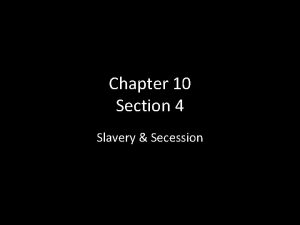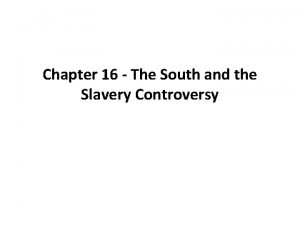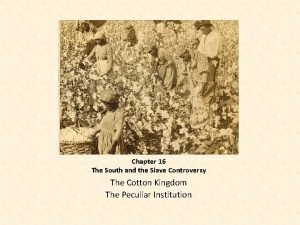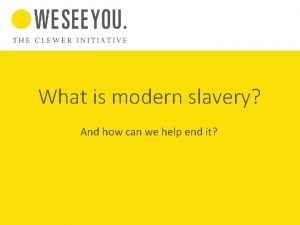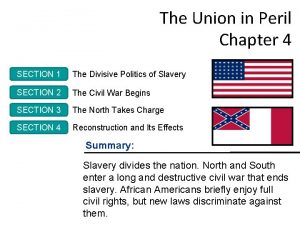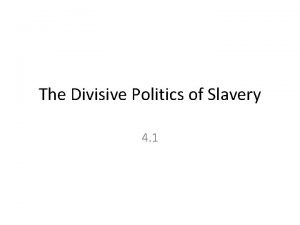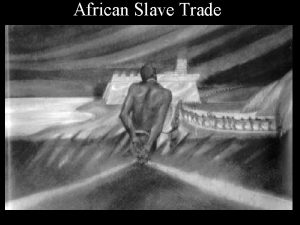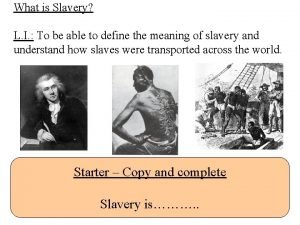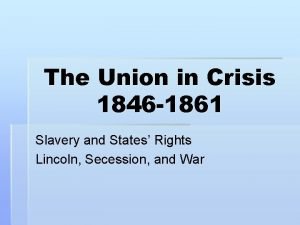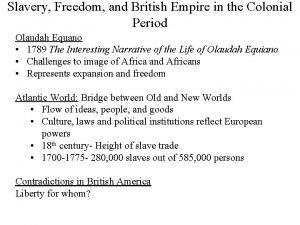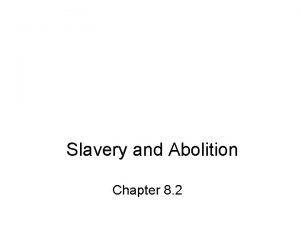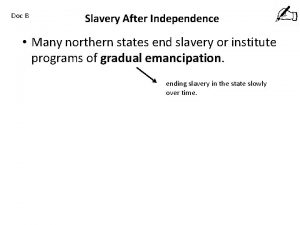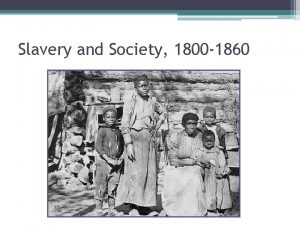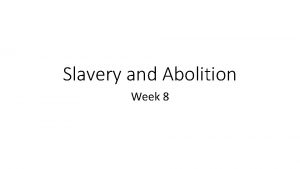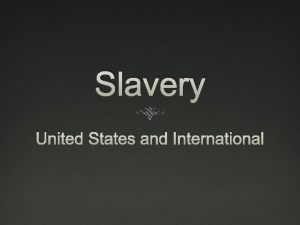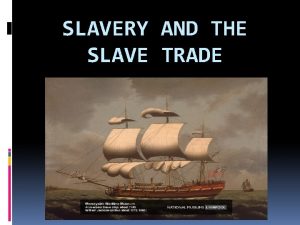Christianity and Slavery How Christianity Set the Foundation







































- Slides: 39

Christianity and Slavery How Christianity Set the Foundation for the Abolition of Slavery Worldwide By Dr. H. C. Felder Giving. Answer. org

Road. Map • • • Introduction Why is this Important? The History of Slavery Christianity and the Abolition of Slavery Summary Conclusion By Dr. H. C. Felder Giving. Answer. org

Introduction • In this message I plan to demonstrate how slavery was tolerated since the dawn of man through various cultures and religions and how Christianity set the foundation for the abolition of slavery world-wide By Dr. H. C. Felder

Why is this Important? • Because many African Americans see Christianity as synonymous with slavery • The idea that Christianity endorses slavery is seen as a stumbling block By Dr. H. C. Felder

Road. Map • Introduction • Why is this Important? • The History of Slavery By Dr. H. C. Felder Giving. Answer. org

The History of Slavery • Every major culture has engaged in slavery – “Before the modern era, by and large Europeans enslaved other Europeans, Asians enslaved other Asians, Africans enslaved other Africans, and the indigenous peoples of the Western Hemisphere enslaved other indigenous peoples of the Western Hemisphere. ” (Sowell, 113) By Dr. H. C. Felder

The History of Slavery Ancient Times • “The earliest civilizations-along the Tigris and Euphrates rivers in Mesopotamia, the Nile in Egypt, the Indus Valley of India, and China's Yangtze River Valley--had slavery. ” (Digital History) By Dr. H. C. Felder

The History of Slavery Ancient Times • Babylonians (1792 to 1750 B. C) – “The ancient Babylonians clearly had slaves. Their rules for conduct was outlined in the Code of Hammurabi, the king of Babylon from 1792 to 1750 B. C. Society was broken down into three classes, the propertied class, freedmen, and slaves” (History. com) By Dr. H. C. Felder

The History of Slavery Ancient Times • Babylonians (1792 to 1750 B. C) – For example: • “Law 282 states that, if a slave were to say to his master I don’t need you then his ear would be cut off. There is also a ton of laws about slave auctions and how to auction off slaves” (Hummarabi Code) By Dr. H. C. Felder

The History of Slavery Ancient Times By Dr. H. C. Felder • Egypt (1850 - 1450 BC) – Israelites were slaves in Egypt for 400 years

The History of Slavery Ancient Times By Dr. H. C. Felder • Greece (300 -400 BC) – “In Athens during the classical period, a third to a half of the population consisted of slaves. Rome would become even more dependent on slavery. . . Most early societies lacked a word for freedom. ” (digitalhistory. uh. edu)

The History of Slavery Ancient Times By Dr. H. C. Felder • Romans (1 st century) – One it two people living under the Roman empire were slaves – “Slaves in Rome might include prisoners of war, sailors captured and sold by pirates, or slaves bought outside Roman territory” (pbs. com) – “All slaves and their families were the property of their owners, who could sell or rent them out at any time. Their lives were harsh. Slaves were often whipped, branded or cruelly mistreated. Their owners could also kill them for any reason, and would face no punishment” (pbs. com)

The History of Slavery Modern Times • Europeans Enslaving Europeans – “The term slave has its origins in the word ‘slav. ’ The slavs, who inhabited a large part of Eastern Europe, were taken as slaves by the Muslims of Spain during the ninth century AD. ” (www. bbc. co. uk) By Dr. H. C. Felder

The History of Slavery • Europeans Enslaving Europeans – “Slavery never disappeared from medieval Europe. While slavery declined in northwestern Europe, it persisted in Sicily, southern Italy, Russia, southern France, Spain, and North Africa. Most of these slaves were ‘white, ’ coming from areas in Eastern Europe or near the Black Sea” (digitalhistory. uh. edu) – “The peoples of the Balkans were enslaved by fellow Europeans, as well as by the peoples of the Middle East, for at least six centuries before the first African was brought to the Western Hemisphere. ” (Sowell, 113) By Dr. H. C. Felder

The History of Slavery Modern Times By Dr. H. C. Felder • Africans Enslaving Africans – “the region of West Africa from which Kunte Kinte supposedly came was one of the great slavetrading regions of the continent— before, during, and after the white man arrived. It was the Africans who enslaved their fellow Africans, selling some of these slaves to Europeans or to Arabs and keeping others for themselves. Even at the peak of the Atlantic slave trade, Africans retained more slaves for themselves than they sent to the Western Hemisphere. ” (Klein, 10)

The History of Slavery Modern Times By Dr. H. C. Felder • Arabs Enslaving Africans – “But the much less publicized slave trade to the Islamic countries had even higher mortality rates en route, as well as involving larger numbers of people over the centuries. . . By a variety of accounts, most of the slaves who were marched across the Sahara toward the Mediterranean died on the way. ” (Sowell, 125)

The History of Slavery Modern Times By Dr. H. C. Felder • Africans Enslaving Whites – “At least a million Europeans were enslaved by North African pirates alone from 1500 to 1800, and some European slaves were still being sold on the auction block in Egypt, years after the Emancipation Proclamation freed blacks in the United States. ” (Sowell, 112)

The History of Slavery America • Native Americans Enslaving Native Americans – “Long before the arrival of Europeans, most tribes in the region had practiced a traditional form of kinship slavery” (encyclopedia. com) By Dr. H. C. Felder

The History of Slavery • America – Native Americans Enslaving Native Americans • “Once Europeans arrived as colonialists in North America, the nature of Indian slavery changed abruptly and dramatically. Indians found that British settlers, especially those in the southern colonies, eagerly purchased or captured Indians to use as forced labor in cultivating tobacco, rice, and indigo. More and more, Indians began selling war captives to whites rather than integrating them into their own societies” (slaveryinamerica. org) By Dr. H. C. Felder

The History of Slavery America • Native Americans Enslaving African Americans – The National Museum of the American Indian’s curator Pual Chatt Smith (Comanche) states “The Five Civilized Tribes were deeply committed to slavery, established their own racialized black codes, immediately reestablished slavery when they arrived in Indian territory, rebuilt their nations with slave labor, crushed slave rebellions, and enthusiastically sided with the Confederacy in the Civil War. ” (smithsonianmag. com) By Dr. H. C. Felder

The History of Slavery America • Native Americans Enslaving African Americans – Smith also says “They were willful and determined oppressors of blacks they owned, enthusiastic participants in a global economy driven by cotton, and believers in the idea that they were equal to whites and superior to blacks. ” By Dr. H. C. Felder

The History of Slavery America • Native Americans Enslaving African Americans – “Choctaw chief Greenwood Le. Flore had 15, 000 acres of Mississippi land 400 enslaved Africans under his dominion” By Dr. H. C. Felder

The History of Slavery America • African Americans Enslaving African Americans – They were often slaves themselves who were freed by their master or purchased their own freedom – “free black slaveowners resided in every Southern state which countenanced slavery and even in Northern states. In Louisiana, Maryland, South Carolina, and Virginia, free blacks owned more than 10, 000 slaves, according to the federal census of 1830” (Koger, 1) By Dr. H. C. Felder

The History of Slavery • America – African Americans Enslaving African Americans • The slaves were not kin, but bought as slave labor to work plantations and in various other occupations – We know this based on census records, wills, bill of sales, and tax records • In Charleston, “By 1800 nearly one out of every three colored heads of household were recorded with slave property. Between 1820 and 1840, the percentage of slaveholding heads of family ranged from 72. 1 to 77. 7 percent. ” (Koger, 24) By Dr. H. C. Felder

The History of Slavery • America – African Americans Enslaving African Americans • “there were thousands of other blacks in the antebellum South who were commercial slaveowners, just like their white counterparts. An estimated onethird of the ‘free persons of color’ in New Orleans were slaveowners and thousands of these slaveowners volunteered to fight for the Confederacy during the Civil War. ” (Sowell, 127) By Dr. H. C. Felder

Road. Map • • Introduction Why is this Important? The History of Slavery Christianity and the Abolition of Slavery By Dr. H. C. Felder Giving. Answer. org

Christianity and the Abolition of Slavery • The reason for the abolition of slavery – Man being made in the image of God is the key theological point that makes slavery incompatible with Christianity – The first anti-slavery elements started in the colonies among Christians • “the Philadelphia Quakers banned the ownership of slaves by its members. ” (Sowell, 130) By Dr. H. C. Felder

The History of Slavery • The anti-slavery sentiment then grew in Britain with other Christians – “Quakers were the first to require members of their congregations to cease being slave owners. Evangelicals in the Anglican church—notably William Wilberforce in Parliament—joined the Quakers and took the issue to the general public with a decades-long political struggle to get the British government to ban the trading of slaves. ” (Sowell, 130) By Dr. H. C. Felder

Christianity and the Abolition of Slavery • The reason for the abolition of slavery – The anti-slavery sentiment then grew in Britain with the Christians • “within Western civilization, the principal impetus for the abolition of slavery came first from very conservative religious activists—people who would today be called ‘the religious right. ’” (Sowell, 116) • “What was historically unusual was the emergence in the late eighteenth century of a strong moral sense that slavery was so wrong that Christians could not in good conscience enslave anyone or countenance the continuation” (Sowell, 128) By Dr. H. C. Felder

Christianity and the Abolition of Slavery • The process of the abolition of slavery – Anti-slavery ideology spread throughout Europe. The advancement of European imperialism around the world is responsible for the retreat of slavery worldwide • “The British navy entered Brazilian waters in 1849 and destroyed Brazilian ships that had been used in the slave trade. ” (Sowell, 177) By Dr. H. C. Felder

Christianity and the Abolition of Slavery • The process of the abolition of slavery – “The British government pressured the Ottoman Empire into banning the African slave trade and, later, threatened to start boarding Ottoman ships in the Mediterranean if that empire did not do a better job of policing the ban. ” (Sowell, 116) – “Americans stamped out slavery in the Philippines, the Dutch stamped it out in Indonesia, the Russians in Central Asia, the French in their West African and Caribbean colonies. Germans, in their East Africa colonies, often hanged slave traders on the spot when they caught them in the act. ” (Sowell, 116) By Dr. H. C. Felder

Christianity and the Abolition of Slavery • The result of the abolition of slavery – Christianity sets the captive free physically • “While slavery was common to all civilizations, as well as to peoples considered uncivilized, only one civilization developed a moral revulsion against it, very late in its history—Western civilization. ” (Sowell, 115) By Dr. H. C. Felder

Christianity and the Abolition of Slavery • Christianity sets the captives free spiritually – Everyone who does not know Christ is in bondage to sin • “Jesus answered them, ‘Truly, truly, I say to you, everyone who commits sin is the slave of sin. ’” (Jn. 8: 34) – Only Christianity frees us from the bondage of sin • “So if the Son makes you free, you will be free indeed” (Jn. 8: 36) By Dr. H. C. Felder

Road. Map • • • Introduction Why is this Important? The History of Slavery Christianity and the Abolition of Slavery Summary By Dr. H. C. Felder Giving. Answer. org

Summary • Slavery existed since the dawn of mankind • Slavery was common to all civilizations • It was only under Christianity that the idea of slavery was challenged • Christianity lit the spark that ignited the fire that destroyed slavery world-wide By Dr. H. C. Felder

Road. Map • • • Introduction Why is this Important? The History of Slavery Christianity and the Abolition of Slavery Summary Conclusion By Dr. H. C. Felder Giving. Answer. org

Conclusion • Not only is Christianity far from being a slave religion, Christianity set men and women of every ethnicity free physically and spiritually By Dr. H. C. Felder

Contact Info • • • Dr. H. C. Felder Giving An Answer www. Giving. Answer. org www. facebook. com/Giving. Answer www. You. Tube. com/Giving. Answer @hcfelder By Dr. H. C. Felder

Bibliography • • • "Code of Hummurabi" History. com. 2018. https: //www. history. com/topics/ancienthistory/hammurabi (accessed Oct 01, 2018). "Hummurabi's Code of Laws. " https: //hammurabicode. weebly. com/ (accessed Oct 05, 2018). "How Native American Slaveholders Complicate the Trail of Tears Narrative. " Smithsonian. com. Ryan P. Smith. Mar 06, 2018. https: //www. smithsonianmag. com/smithsonian-institution/hownative-american-slaveholders-complicate-trail-tears-narrative-180968339/#Qw. SXLx. FSps. PUVs. Sw. 99 (accessed Oct 01, 2018). Koger, Larry. Black Slaveowners: Free Black Slave Masters in South Carolina, 1790 -1860. 2014 "Native Americans And Slavery. " Encyclopedia. com. 2008. Gale Library of Daily Life. https: //www. encyclopedia. com/humanities/applied-and-social-sciences-magazines/nativeamericans-and-slaveryl (accessed Oct 07, 2018). "Native Americans And Slavery. " Encyclopedia. com. 2008. Gale Library of Daily Life. https: //www. encyclopedia. com/humanities/applied-and-social-sciences-magazines/nativeamericans-and-slavery (accessed Oct 07, 2018). "Slaves & Freemen" pbs. org. 2006. https: //www. pbs. org/empires/romans/empire/slaves_freemen. html (accessed Oct 05, 2018). "Slavery and Native Americans in British North America and the United States: 1600 to 1865. " www. slaveryinamerica. com. 2012. Tony Seybert. https: //web. archive. org/web/20040804001522/http: //www. slaveryinamerica. org/history/hs_es_in dians_slavery. htm (accessed Oct 08, 2018). Sowell, Thomas. Black Rednecks and White Liberals. New York: Encounter Books, 2006. "The Roots of Slavery. " BBC World Service. http: //www. bbc. co. uk/worldservice/africa/features/storyofafrica/9 chapter 1. shtml (accessed Oct 07, 2018). By Dr. H. C. Felder
 Total set awareness set consideration set
Total set awareness set consideration set Training set validation set test set
Training set validation set test set Shallow pad foundation
Shallow pad foundation Composition of urine
Composition of urine Lesson 1 slavery and western expansion
Lesson 1 slavery and western expansion Chapter 10 section 4 guided reading slavery and secession
Chapter 10 section 4 guided reading slavery and secession The south and the slavery controversy
The south and the slavery controversy Chapter 16 the south and the slavery controversy
Chapter 16 the south and the slavery controversy Chapter 16 the south and the slavery controversy
Chapter 16 the south and the slavery controversy Slavery freedom and the struggle for empire
Slavery freedom and the struggle for empire Racism and slavery
Racism and slavery Chapter 11 cotton slavery and the old south
Chapter 11 cotton slavery and the old south Chapter 11 cotton slavery and the old south
Chapter 11 cotton slavery and the old south What is the overlap of data set 1 and data set 2?
What is the overlap of data set 1 and data set 2? Why was the fairtrade foundation set up
Why was the fairtrade foundation set up Chapter 16 lesson 2 challenges to slavery
Chapter 16 lesson 2 challenges to slavery From slavery through reconstruction
From slavery through reconstruction Apush chapter 2 american experiments
Apush chapter 2 american experiments Slavery in belize
Slavery in belize Comparing colonial regions
Comparing colonial regions What was the first new england colony
What was the first new england colony Total fertility rate formula
Total fertility rate formula Rooney family slavery
Rooney family slavery Chapter 4 section 1 the divisive politics of slavery
Chapter 4 section 1 the divisive politics of slavery The divisive politics of slavery
The divisive politics of slavery Slavery grievance (modified) answer key chart
Slavery grievance (modified) answer key chart Iron muzzle
Iron muzzle Slavery meaning
Slavery meaning Pan-africanism apush definition
Pan-africanism apush definition Colonial slavery apush
Colonial slavery apush Uncle tom’s cabin
Uncle tom’s cabin Fourierism
Fourierism Slavery
Slavery The abolitionists
The abolitionists John breckinridge opinion on slavery
John breckinridge opinion on slavery Heart of darkness part 3
Heart of darkness part 3 Doc
Doc Slavery divides the nation
Slavery divides the nation How did bleeding kansas embody the slavery controversy
How did bleeding kansas embody the slavery controversy How strongly do you agree with the following statement
How strongly do you agree with the following statement





